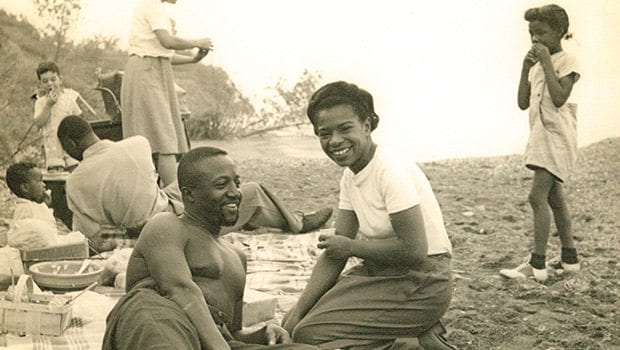
Former Banner Managing Editor Robin Washington produced the public television documentary “You Don’t Have to Ride Jim Crow!” He may be reached at robin@robinwashington.com or via Twitter @robinbirk.
In a life spanning 91 years — more than 40 of those spent off-the-grid on a Deerfield farm demonstrating how anyone could live simply without contributing to war and economic disparity — Juanita Nelson inspired thousands.
On Saturday, hundreds of those souls marched behind a New Orleans-style funeral band for a mile from the town common to the middle school to share their stories of the power of her life.
Born Juanita Morrow in 1923, Nelson died March 9 in Greenfield after a lifetime of activism that took her from Cleveland, Ohio, to Howard University and early careers in the 1940s as a reporter for the black press and organizer for the Congress of Racial Equality. She then dedicated her life to pacifism, and with her husband Wally, spent half a century in a subsistence lifestyle freeing them from the requirement of filing income tax used to support war and other injustices.
“We don’t have electricity. We don’t have plumbing. We use an outhouse,” she said in a 1994 interview for the public television documentary, “You Don’t Have to Right Jim Crow!”
“The reason I don’t have those things is that I want to be as little connected as I can to our economy as it is, with the big corporations, with a lot of money-making, that sort of thing,” she continued, describing how they grew just enough food to eat and sold a small surplus for incidental expenses.
The Nelsons — who never legally married but were frequently described as inseparable until Wally’s death in 2002 — built their home themselves on Quaker-owned land in Deerfield in 1974, following years of activism around the country. Along with being early organizers of CORE, the couple co-founded the pacifist Peacemakers group in Ohio in the late 1940s and in 1957 put their lives on the line to keep the interracial Koinonia Farm alive in Americus, Ga.
Though it was a year after the Montgomery Bus Boycott and three years after the Brown v. Board of Education decision outlawing segregation, racial bigotry still ruled the Deep South.
“We were down there four months and there were about nine shootings into the community while we were there,” she recalled in an interview with Memorial Hall Museum Online website of Deerfield’s Pocumtuck Valley Memorial Association.
After one scare while on watch duty in their car, Nelson said she decided the best way to meet those who would do them harm was face-on.
“We’d get out of the car and stand under the light, which is, tactically and morally, for me, the best thing to do,” she said.
At her memorial service, longtime friends and fellow travelers shared similar stories of her steely resolve — and wit.
“An ongoing argument that some of us had with Juanita was that she didn’t want to call herself an organizer,” recalled Ruth Benn of the War Resisters League. “She would say, ‘I can’t make anybody do anything. The big thing is that I do what I can.’”
Of Nelson’s economic theories, Benn added: “She suggests watching a jar of pennies on your desk to see if after a few days there are 101 pennies and then 102 and 110. She concluded that money does not have reproductive powers and that earning interest must come off the back of someone else.”
Bob Bady, another activist she deeply influenced, described Nelson as an economist, though her degree after leaving Howard was in speech pathology from Ohio State University.
“She strove to deconstruct and understand all of the economic relationships in her life,” he said, adding that she advocated voluntary poverty after having been born into involuntary poverty.
I too experienced her uncompromising sense of principle. In 1994, as producer of a television documentary about the first Freedom Ride, in 1947, that challenged Southern segregation, I needed to get Wally to a Virginia reunion with his fellow participants. The filming was scheduled for a Saturday, the same day the Nelsons sold their beans in Greenfield’s farmer’s market.
To get Wally out on schedule, I suggested a food bank might buy the beans in bulk. But Juanita would have none of it, seeing through my ruse and making it clear that the farmer’s market was an integral part of their lifestyle, not a capitalistic by-product of it. They went to the market as usual, and Wally flew out the next day.
They lived their ideals and challenged conventions in other ways. Though Juanita took Wally’s surname, “They told me many times they deliberately made a decision not to get legally married, saying that government had no business in that part of people’s lives,” longtime friend and fellow antiwar activist Randy Kehler said shortly after her passing.
Yet they were appreciative of government imprimatur in another aspect of their lives, pointing out with pride their “two-seater” as the “only state-licensed outhouse in Franklin County.”
The couple had no children. After Wally’s death, Juanita continued the farm but eventually moved in with Kehler and his wife, Betsy Corner, in Greenfield.
“Her memory, as affected by dementia, kept shortening and the repetition of questions increased. ‘What time is it? What day is it? What’s the temperature?’ Corner wrote in March.
“But just when you thought that she wasn’t much there, Nita could come out with a zinger: ‘Getting old isn’t for sissies’,” Corner quoted Nelson saying.
Nor is a life of determined nonviolent activism, which Juanita Nelson lived so well.






